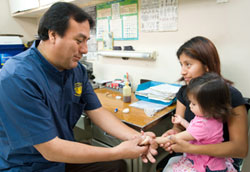Because of a lapse in government funding, the information on this website may not be up to date, transactions submitted via the website may not be processed, and the agency may not be able to respond to inquiries until appropriations are enacted. The NIH Clinical Center (the research hospital of NIH) is open. For more details about its operating status, please visit
cc.nih.gov. Updates regarding government operating status and resumption of normal operations can be found at
opm.gov.
Fogarty awards bioethics grants
May / June 2012 | Volume 11, Issue 3

Photo by David Snyder
New awards from Fogarty's Bioethics program
will help enhance standards regarding
informed consent and other ethical issues
related to clinical trials in low- and middle-
income countries.
Fogarty International Center recently issued five awards totaling $5.75 million over five years to support the first research ethics program in Turkey and a new project that will provide bioethics education to researchers in the Balkans, as well as existing bioethics training in sub-Saharan Africa. Fogarty's
International Research Ethics Education and Curriculum Development Award program will fund graduate curricula and educational opportunities for researchers conducting studies involving human subjects in resource-poor settings.
"Bioethics is at the foundation of research involving human subjects," said Fogarty Director Dr. Roger Glass. "These grants will strengthen global health curricula at institutions in low- and middle-income countries to ensure scientists and administrators are able to design and manage ethical research studies. This is increasingly important as more clinical trials are conducted in developing countries."
The award going to Children's Hospital Boston will allow Koc University School of Medicine in Istanbul to launch the first systematic research ethics education program in Turkey, helping to overcome institutional barriers and establish a research administration infrastructure. The project will eventually become a regional hub, expanding into Azerbaijan, Tajikistan, Kazakhstan, Kyrgyzstan and Uzbekistan.
Mt. Sinai School of Medicine and the University of Belgrade School of Medicine will use their combined resources to create ethics curricula designed to meet the needs of clinicians, researchers and other health professionals in the region. The program will have a strong emphasis on research professionalism and developing critical analysis skills. Based in Belgrade, the project will also educate trainees in Macedonia, Bosnia and Herzegovina, Montenegro, Croatia and Albania.
Johns Hopkins University's award will support an ongoing bioethics training collaboration that pairs the university with a different sub-Saharan African partner institution each year. Students enrolled will complete original research ethics practicums in their home countries with mentoring from both U.S. and African faculty.
A grant going to Indiana University will help expand a training partnership with Moi University in Eldoret, Kenya, by developing topic-based short courses and opening an annual teaching skills workshop to other researchers and organizations in East Africa. The two universities use an approach of shared management, creation of overlapping curricula and co-mentoring students at each institution.
The University of KwaZulu-Natal in Durban, South Africa, will use its funding to continue offering an interdisciplinary, Africa-based master's program in health research ethics. The program builds capacity throughout the region by recruiting the majority of its students from outside South Africa. At the end of each year, the top trainee is selected for an internship in Geneva and the opportunity to participate in the ethics review committee of the WHO.
Participating with Fogarty as NIH funding partner is the National Institute of Allergy and Infectious Diseases.
Fogarty Bioethics awards
More Information
To view Adobe PDF files,
download current, free accessible plug-ins from Adobe's website.